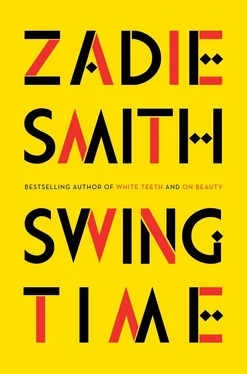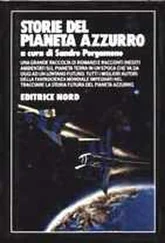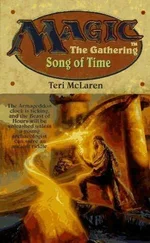Four
Stepping out of a bush taxi — after several months’ absence — I spotted Fern standing by the side of the road, apparently waiting for me, right on time, as if there were a bus stop and a timetable. I was happy to see him. But he proved to be not in the mood for greetings or pleasantries, falling in step with me and immediately launching into a low-voiced debriefing, so that before I’d even reached Hawa’s door I, too, was burdened with the rumor presently gripping the village: that Aimee was in the process of organizing a visa, that Lamin would soon move permanently to New York. “Well, is it the case?” I told him the truth: I didn’t know, and didn’t want to know. I’d had an exhausting time in London, holding Aimee’s hand through a difficult winter, personally and professionally, and I was feeling as a consequence particularly averse to her brand of personal drama. The album she’d spent a grim British January and February recording — which should have been released about now — had instead been abandoned, the consequence of a brief, ugly affair with her young producer, who then took his songs with him. Only a few years earlier a break-up like this would have been only a minor setback to Aimee, hardly worth half a day in bed watching old episodes of long-forgotten Aussie soaps— The Flying Doctors, The Sullivans— something she did in moments of extreme vulnerability. But I had noticed a change in her, her personal armor was no longer what it once was. Leaving, and being left — these operations now affected her far more deeply, they were no longer water off a duck’s back to her, she was actually wounded, and took no meetings with anyone except Judy for almost a month, barely leaving the house and asking me several times to sleep in her room, just by her bed, on the floor, as she did not want to be alone. During this period of purdah I had assumed, for better or worse, that nobody was closer to her than me. Listening to Fern, my first feeling was that I had been betrayed, but the more I considered it I saw that this was not quite right: it was not deceit but a form of mental separation. I was comfort and company for her in a stalled moment, while, in another compartment of her heart, she was busily planning for the future, with Lamin — and Judy was her co-conspirator in that. Instead of being annoyed at Aimee I found myself frustrated by Fern: he was trying to get me involved, but I didn’t want any part of it, it was inconvenient for me, I had my trip already all planned out, and the more Fern spoke the further I saw the itinerary plotted in my head slipping away from me. A visit to Kunta Kinteh Island, a few afternoons at the beach, two nights in one of the fancy hotels in town. Aimee gave me almost no annual leave, I had to be resourceful, stealing holidays where I could.
“OK, but why not take Lamin with you? He’ll talk to you. With me he is like a clam.”
“To the hotel? Fern — no. Terrible idea.”
“On your trip then. You cannot go out there by yourself anyway, you’ll never find it.”
I gave in. When I told Lamin he was happy, not about visiting the island itself, I suspected, but because of the opportunity to escape the classroom and spend an afternoon negotiating with his friend Lolu, a cab driver, over the round-trip price. Lolu’s Afro had been cut into a Mohican, tinged orange, and he wore a thick belt with a big silver buckle that read BOY TOY. They appeared to negotiate all the way there, a two-hour journey filled with laughter and debate in the front seat, Lolu’s deafening reggae music, many phone calls. I sat in the back, with little more Wolof than I’d had before, watching the bush go by, spotting the odd silver-gray monkey and ever more isolated settlements of people, you couldn’t even call them villages, just two or three huts together, and then nothing again for another ten miles. I remember in particular two barefoot girl children walking by the road, hand in hand, they looked like best friends. They waved at me and I waved back. There was nothing and no one around them, they were out on the edge of the world, or of the world I knew, and watching them I realized it was very hard, almost impossible, for me to imagine what time felt like for them, out here. I could remember being their age, of course, holding hands with Tracey, and how we had considered ourselves “eighties kids,” more savvy than our parents, far more modern. We thought we were products of a particular moment, because as well as our old musicals we liked things like Ghostbusters and Dallas and lollipop flutes. We felt we had our place in time. What person on the earth doesn’t feel this way? Yet when I waved at those two girls I noticed I couldn’t rid myself of the idea that they were timeless symbols of girlhood, or of childish friendship. I knew it couldn’t possibly be the case but I had no other way to think of them.
The road ended finally at the river. We got out and walked up to a thirty-foot concrete statue of a stick man who stood facing the river. He had the whole of planet Earth for a head and was yanking his stick arms free from slavery’s chains. A lone nineteenth-century cannon, the red-brick shell of an original trading post, a small “slavery museum built in 1992” and a desolate café completed what a desperate guide with few teeth described as “the Welcome Center.” Behind us a village of broken-down shacks, poorer by many orders of magnitude than the one we had come from, stubbornly faced the old trading post, as if hoping it might reopen. A crowd of children sat watching our arrival but when I waved to them our guide told me off: “They are not allowed to come any closer. They beg for money. They bother you tourists. The government has chosen us as official guides so that you are not bothered by them.” About a mile across the river I could see the island itself, a small, rocky outcrop with the picturesque ruins of barracks upon it. All I wanted was a minute’s quiet to contemplate where I was and what, if anything, it meant. Here and there, between the triangle of café, slave statue and watching children, I could see and hear groups of tourists — a solemn Black-British family, some enthusiastic African-American teenagers, a couple of white Dutch women, both already freely weeping — who were all trying to do the same, and likewise enduring a recited lecture from one of the official government guides in their ragged blue T-shirts, or having menus thrust into their hands from the café, or haggling with boatmen eager to take them across to see the prison cells of their ancestors. I saw I was lucky to have Lamin: while he engaged in his favorite activity — intense, whispered financial negotiation, with several parties at once — I was free to wander over to the cannon, to sit astride it and look out over the water. I tried to put myself in a meditative frame of mind. To picture the ships in the water, the human property walking up the gangplanks, the brave few who took their chances and leaped into the water, in a doomed attempt to swim to shore. But every image had a cartoon thinness to it, and felt no closer to reality than the mural on the side of the museum that showed a strapping, naked Mandinka family in neck chains being chased out of the bush by an evil Dutchman, as if they’d been trapped like prey by a hunter rather than sold like grain by their chief. All paths lead back there, my mother had always told me, but now that I was here, in this storied corner of the continent, I experienced it not as an exceptional place but as an example of a general rule. Power had preyed on weakness here: all kinds of power — local, racial, tribal, royal, national, global, economic — on all kinds of weakness, stopping at nothing, not even at the smallest girl child. But power does that everywhere. The world is saturated in blood. Every tribe has their blood-soaked legacy: here was mine. I waited for whatever cathartic feeling people hope to experience in such places, but I couldn’t make myself believe the pain of my tribe was uniquely gathered here, in this place, the pain was too obviously everywhere, this just happened to be where they’d placed the monument. I gave up and went in search of Lamin. He was leaning against the statue, on his new phone, a fancy-looking BlackBerry, with a dozy look on his face, a big, foolish smile, and when he saw me coming he shut it off without saying good-bye.
Читать дальше












